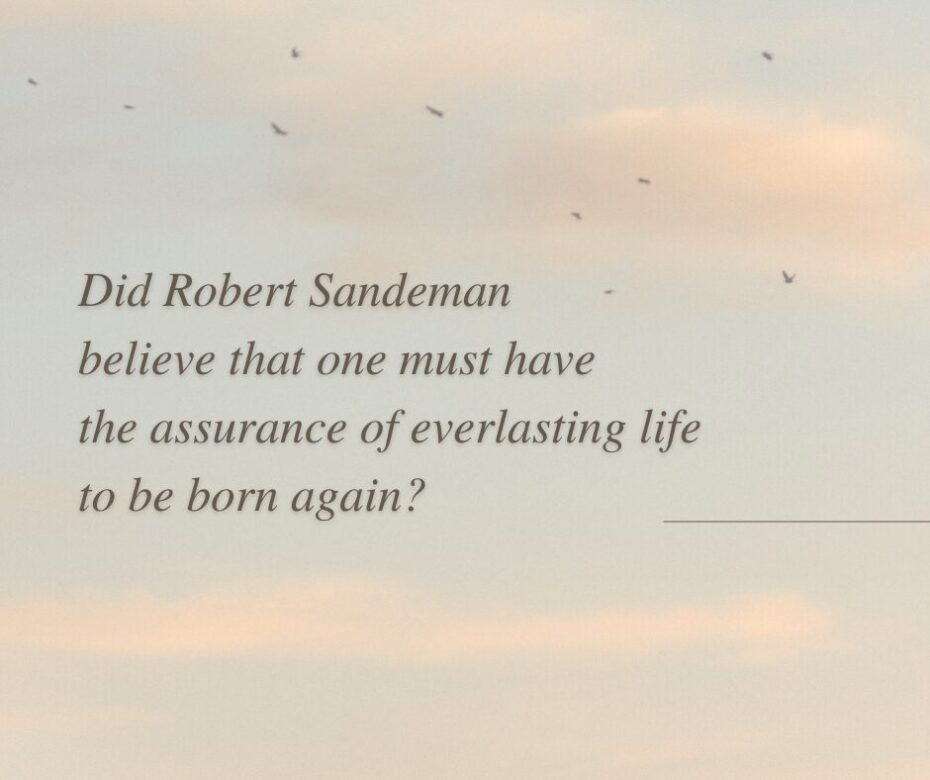Most Focused Free Grace advocates have never heard of Robert Sandeman (1718-1771). He was born in Scotland and planted churches there. In 1760, he came to America and planted churches here, dying in Danbury, CT, in 1771. He was just fifty-two.
His father-in-law was John Glas, a Scottish minister who profoundly influenced him. Christianstudylibrary.org has an article entitled “The Dangers of Sandemanianism” by Michael Roberts (see here). Concerning Glas, Roberts writes, “Indeed, [Glas] came to ask the question: Was it right to impose the Westminster Confession of Faith and the Catechisms on Christian ministers and office-bearers? Surely, God’s Word is enough.”
Sandeman famously said that “justification comes from bare faith” (Robert Sandeman, Letters on Theron and Aspasio, vol. 2 (Edinburgh: Sands, Donaldson, Murray, and Conchran, 1759), 330.
GotQuestions.org, a Calvinist website, says this about Sandemanianism (see here):
Sandemanianism’s true divergence from orthodoxy concerned the concept of faith. Sandemanians equated faith with mere intellectual assent to the facts of the Bible. Defined as a “simple faith” or “bare faith,” the faith promoted by Sandeman required no emotion or even an act of the will to produce salvation. It was an extreme version of easy believism. Sandemanians did not look for spiritual changes as the Holy Spirit interacted with them because that was a too subjective measure and unnecessary. Sandemanians thus opened themselves up to charges of antinomianism. In his epitaph, Sandeman said “that the bare death of Jesus Christ without a thought or deed on the part of man is sufficient to present the chief of sinners spotless before God” (www.britannica.com/biography/Robert-Sandeman, accessed 2/8/22).
As Sandemanianism spread around England and to America, so did the censure. Critics said that Sandemanianism produced a cold orthodoxy, an authoritarian church, and too much of a focus on the local church over the universal church. Sandemanians strayed from the Westminster definition of faith, and some said that they had the faith of devils because it was absurd to propose that God justified any person through a faith unaccompanied by love (see James 2:19). Sandemanians were missing the important trust aspect of faith—actual reliance on God’s Word instead of only rational acceptance.
Even with such harsh criticism, it took a long time for Sandemanianism to completely die out. The last of the Sandemanian churches in America closed in 1890. Their London meeting house did not close until 1984, and the last elder of the church started by Glas and Sandeman died in Edinburgh in 1999.
Did Sandeman believe that assurance is of the essence of saving faith? I think he might have, but I could not find a quote. He seemed to point to Christ’s shed blood and His finished work as the object of saving faith, not His promise of everlasting life that can never be lost.
Roberts implied that Sandeman believed that assurance is of the essence of saving faith: “The Sandemanian view was that men should not be encouraged to search themselves for evidences of grace for that is too subjective and is not necessary.” Sandemanianism finds assurance solely in the objective promise of God to the believer.
I’m also not sure whether he taught about eternal rewards.
But his view that all that is required to be born again and eternally secure is “bare faith” is outstanding. In that regard, I’m a Sandemanian.i However, Flexible Free Grace advocates explicitly reject Sandeman’s understanding of faith.ii
Mike Makidon wrote an excellent journal article on Sandeman that you can read here. However, he focused on Sandeman’s understanding of faith, not his understanding of the object of saving faith. A study of Sandeman’s fuller views on soteriology and eschatology would make an excellent topic for a thesis or dissertation.
__________
i In an article on Sandemanianism at Theopedia.com, the author implies that all who hold to Focused Free Grace are Sandemanian: “Those who hold to the concept of Lordship salvation argue that the view espoused by proponents of Non-Lordship salvation is essentially the errant view of the 18th century Sandemanians” (see here).
ii Flexible Free Grace people are not Sandemanian. They reject faith as mere intellectual assent. For example, in the book A Defense of Free Grace Theology, Anderson wrote, “Why can’t we put this false charge of ‘mental assent’ to rest? Hodges didn’t believe it; Dillow doesn’t believe it; I don’t believe it. The only Free Grace theologian that has written much on the subject and does believe in the “mental assent” view, as far as I know, is Bob Wilkin” (p. 81). This 2019 article by me gives more details if you are interested.


